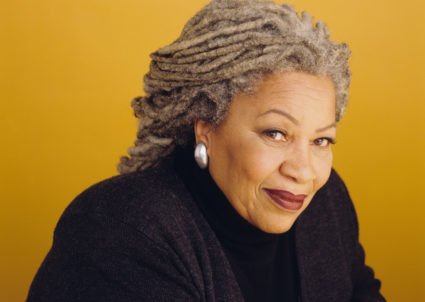
Lessons we can learn from Toni Morrison
Toni Morrison was big on life.
While American society lacked imagination in understanding black lives, Morrison, who died Monday at age 88, filled in the details. Pulling from African literature, slave folklore or black history, Morrison portrayed her black characters as complex, vibrant, and flawed people, transforming American literature.
As a writer, she recognized the need to capture the experiences of black women, who seldom saw themselves in the center of their own stories. As an editor, she introduced a slate of new black voices into the American publishing world. When asked about a talking point of her work "Beloved" — that her characters were "larger than life" — Morrison told the PBS NewsHour that the criticism was evidence of small-mindedness.
"My characters are not bigger than life, they are in fact big as life," she told the NewsHour in a 1987 interview. "And life is really very big. We tend to cut it down these days — smaller, and smaller, and smaller — to make it fit, I don't know what, a headline or a room."
Cheryl Wall, a distinguished professor of English at Rutgers University, said, for Morrison, "life is never just about the awful situation, not even when she's writing about slavery, but it's the little everyday ceremonies of life."
Wall said no matter what Morrison wrote about, there were always moments of levity in her novels. These moments appear in "The Bluest Eye," "Sula," and even "Beloved," sometimes in between delicious descriptions of food.
"Morrison is always aware there's more to life than grimness and oppression, no matter how onerous that oppression is because the joy — or the triumph, rather — is that people survive that oppression," Wall said.
Morrison wasn't afraid to speak publicly about the themes in her novels and to challenge journalists on their questions. Here are several lessons to remember about Morrison's career as a writer.
The truth she offered on white supremacy
"Toni Morrison: The Pieces I Am," a documentary released earlier this year, rolls through interview clips between Morrison and various journalists. One exchange in particular stuck out: her 1993 interview with PBS' Charlie Rose.
Responding to a question about experiencing racism, Morrison said people who practice racism are "bereft, there is something distorted about the psyche." Morrison said racist white people don't understand that they are also a race, "it's also constructed, it's also made."
"If I take your race away, and there you are, all strung out. And all you got is your little self, and what is that? What are you without racism? Are you any good? Are you still strong? Are you still smart? Do you still like yourself? I mean, these are the questions."
She continued: "If you can only be tall because somebody is on their knees, then you have a serious problem. And my feeling is: White people have a very, very serious problem, and they should start thinking about what they can do about it. Take me out of it."
Years earlier, in a 1975 keynote address at Portland State University, Morrison said that "the very serious function of racism" is a distraction.
"It keeps you from doing your work. It keeps you explaining, over and over again, your reason for being," she said.
Her immense impact on the publishing world, and women writers in particular
During her editorship at Penguin Random House, Morrison published major works by Toni Cade Bambara, Muhammad Ali and Angela Davis, among others. In the 1970s, Morrison also oversaw the effort to compile a series of images that detailed the black experience in the U.S. The resulting research and edits led to the publication of "The Black Book."
Wall said the book is a "treasure."
"Every home of a black person I went into in the '70s, they had a copy of 'The Black Book," she said. Notably, "The Black Book" also had no narrative, so readers had to make sense of the complicated imagery about black history for themselves.
Wall also said that Morrison and other black women writers of that era helped initiate a "move" in the literary tradition where the main drama in their work wasn't the conflict between white and black men.
"They are interested in the impact of racism, for sure, but it's the impact that women and children, as well as men, experienced at home," Wall said. These black women writers opted, instead, to examine the "interior lives" of their characters, in terms of "what was happening at home as well as what was happening psychologically and emotionally," Wall said.
Morrison's impact on the literary and publishing world would ultimately be felt for generations.
"For scholars like me, and I think for generations of younger black writers, she made our lives possible," Wall said.
Erroll McDonald first met Morrison more than 40 years ago. McDonald said Morrison, while at Penguin Random House at the time, was instrumental in starting his career in publishing. He's now the vice president and executive editor in the Knopf Doubleday division of Penguin Random House.
McDonald said Morrison landed in the American literary landscape at a time when writers the American literary establishment branded as black writers were all male.
"One had Richard Wright, Ralph Ellison and James Baldwin. They were seen as spokesmen for black people. [Morrison], as a woman writer, was a pioneer in that sense," McDonald said. "She once said every single book she'd ever written was a love story. And so she brought an interesting sensibility to her writing that may have escaped the male mind."
Beyond that, McDonald said, Morrison impacted writers who "understood that the American social fabric was complex and underrepresented for the most part in the old school curriculum."
How a writer can grant more authority to the "unfree"
Morrison said part of her mission was to focus on the lives she called "the unfree at the heart of the democratic experiment."
"Beloved," which is among Morrison's most cherished novels, is about a mother who escaped enslavement in Kentucky and fled to Ohio, and making the decision to kill her own child rather than face being forced back into a life of slavery.
In 1987, Morrison sat down with the NewsHour to discuss themes of her then-released novel "Beloved."
The story was inspired by an 1856 newspaper account Morrison found. Morrison said the story, like some other slavery accounts she read, were a "disappointment" in capturing these lives.
"Slavery is so intricate, so immense, and so long, and so unprecedented that you can let slavery be the story, the plot — and we know what that story is. And it is predictable," she told the NewsHour around the time "Beloved" was released.
"And then you do the worst thing, the center of it becomes the institution and not the people. So, if you focus on that characters and their interior life, it's like putting the authority back into the hands of the slaves, rather than the slaveholder."
She eliminated the "white gaze" from her work
Morrison often spoke of how black writers would be encouraged to write for a white audience. She called it — when writers deferred to the "white gaze" — a form of "self-flagellation."
Instead, Morrison, as she said in this year's documentary, "didn't want to speak for black people. I wanted to speak to and be among. It's us."
The PBS NewsHour's John Yang sat down with the documentary's director Timothy Greenfield-Sanders, who has known Morrison for 38 years, to discuss how the film brings the writer's words to the screen.
In the documentary, Morrison described eliminating the "white gaze" this way: "The little white man that sits on your shoulder and checks out everything you do or say. You sort of knock him off and you're free," the author said. She then flicks the imaginary figure from her left shoulder. "Now, I own the world. I can write about anything, to anyone, for anyone."
If you're unfamiliar with Morrison's world, start here
Pulitzer Prize winning poet and former U.S poet laureate Tracy K. Smith said the best book to start in Morrison's oeuvre would be "Beloved."
Former U.S poet laureate Tracy K. Smith offered which book she thought was best to start reading in Morrison's oeuvre.
"It's a vast world and I feel like it moves in different directions across history, but I think for so many of us, 'Beloved' is the heart of her body of work," she told the NewsHour. "I think it's a powerful story on the character level, but it also speaks to this haunting as a nation that we continue to live with."
Of her later works, "A Mercy" is also one of Smith's favorites. It's a book that goes further into the history of slavery in early America, she said, and also involves Native American communities and how they were "implicated in the founding of this American power structure."
READ MORE: Go beyond Toni Morrison with these 7 books that stare down the white gaze
Support Canvas
Sustain our coverage of culture, arts and literature.



















